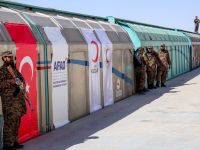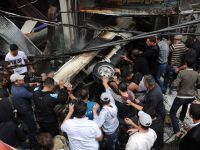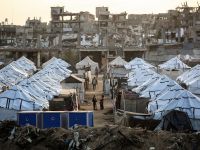Israel has ordered closed the industrial zone near the Erez crossing between the Gaza Strip and Israel following a fight there that left one Palestinian dead and two Israelis injured, Palestinian security officials said.
The zone, which is fully controlled by Israel, employs about 5,000 Palestinian workers.
It is the first time Israel has shut the zone since the eruption of a wave of Israeli-Palestinian violence at the end of September.
The Israeli army did not immediately confirm the closure.
A Palestinian laborer died in an Israeli hospital after being shot during a dispute in the industrial area, in which he stabbed two Israelis, one of whom was his boss, Israel police said.
The death was later confirmed by Palestinian security sources.
Police said the laborer had seriously wounded his Israeli boss in a knife attack. Another Israeli intervened, shooting at the Palestinian, who responded by stabbing his assailant.
Earlier, two Israeli soldiers and a Jewish woman settler were injured when their car came under fire from a Palestinian village near a settlement in the northern West Bank on Thursday, an Israeli army spokesman said.
One of the soldiers was in a critical condition, while the others were seriously injured. All were all taken to a hospital near Tel Aviv, the army said.
The shooting occurred on a road between the Jewish settlements of Shavel Shomron and Khomesh, northwest of Nablus.
The car, carrying four people, came under fire from the village of Burqa, just to the south of Khomesh where the woman lived. The driver of the vehicle was treated for shock, army radio said.
Benny Shalom, an eyewitness interviewed on Israeli television, said the shots were fired from a parked car, which then made off in the direction of Burqa, located in an area of the West Bank under Israeli security control.
Army radio also said an Israeli bus travelling on a bypass road near the northern West Bank town of Jenin came under fire Thursday, but no injuries were reported.
In the Gaza Strip, an army vehicle was shot at near the Jewish settlement of Netzarim, but there were no injuries, it added.
The violence occurred against a backdrop of political disarray in Israel, with parties braced for early elections but with renewed talk of a national unity government to deal with unrest between Israelis and Palestinians.
The violence has gutted the peace process, pitting Arab against Jew and sowing internal divisions on each side.
On Thursday, a Palestinian man was sentenced to death by a state security court after being convicted of murder and treason for the killing of his cousin, a Hamas bomb-maker, in a car bomb blast in the West Bank last month.
The court said after the three-hour trial that Allam Beni Ouda, 24 will be executed by hanging. His only hope is if Palestinian leader Yasser Arafat commutes the sentence to life in prison.
More than 300 people, mostly Palestinians, have been killed since violence broke out in the territories and in Israel in late September.
On Thursday, the Palestinian Authority accused Israel of trying to dilute the powers of a US-led fact-finding mission due to investigate the causes of the violence, unleashed after Israel's hawkish opposition leader visited a disputed holy site in east Jerusalem.
Palestinian officials said the international committee -- led by former US senator and Northern Ireland peace process mediator George Mitchell -- is due to arrive in the region next week.
The committee has not confirmed a date for its arrival.
In Washington, Human Rights Watch singled out Israel in its annual world report on human rights violations.
Investigations "in Israel, the West Bank, and Gaza Strip in early October revealed a pattern of excessive, and often indiscriminate, use of lethal force by Israeli security forces in situations where demonstrators were unarmed and posed no threat of death or serious injury to the security forces or to others," said the report, released Thursday.
The Palestinian Authority (PA) also came under fire in the report for wielding authoritarian tactics against its citizens.
"Palestinians who publicly criticized PA policies were arbitrarily arrested and detained," it said.
Thursday's outburst of violence came after several days of relative calm, during which Israel began shifting its focus away from the Palestinian uprising to the battlefield of politics.
Representatives from Israel's three biggest parties -- Prime Minister Ehud Barak's One Israel, the right-wing Likud and the ultra-Orthodox Jewish Shas -- failed to agree on a date for elections when they met Wednesday, but decided to continue negotiations Monday.
The delay fueled charges that that Barak, who has taken a beating in opinion polls over his handling of the Palestinian uprising, is trying to stave off political defeat.
The question of forming a national unity government also crept back into political discussion, after Likud's hardline leader Ariel Sharon evoked the possibility, in the event he wins at the ballot box.
"I would immediately invite Barak to a unity government," Sharon said in an interview with Israeli public television. But the hawkish politician said the prime minister was laying down too many conditions.
Sharon has repeatedly rebuffed Barak's offers to join an emergency government.
Palestinians have warned that an Israeli government that includes Sharon would kill the peace process.
International efforts, so far unsuccessful, continued in the hopes of finding a way out of the deadly spiral.
After a meeting with Palestinian leader Yasser Arafat on Thursday, the EU's Middle East envoy said Europe was committed to ending the blood-letting and reviving stalled negotiations.
"We are trying to stop any kind of violence," Miguel Angel Moratinos told reporters after their one-hour discussion. "We have been extremely active and we have been supporting any effort in this direction and will continue to do so."
The meeting followed moves at the United Nations on Wednesday by Britain to resolve an impasse over Palestinian demands for 2,000 unarmed UN observers to be stationed in the West Bank and Gaza Strip.
Israel is opposed to an observer force until a peace deal is reached – (AFP)
© 2000 Al Bawaba (www.albawaba.com)







